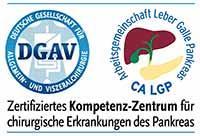Peritoneal Carcinomatosis With Ascites — Intraperitoneal Immunotherapy With Catumaxomab: treatment in the Best Hospitals in the World
Treatment prices are regulated by national law of the corresponding countries, but can also include additional hospital coefficients. In order to receive the individual cost calculation, please send us the request and medical records.

Department of General, Abdominal, Transplant, Hepatopancreatobiliary, Colorectal, Endocrine, Bariatric Surgery and Hernia Surgery
The Department of General, Abdominal, Transplant, Hepatopancreatobiliary, Colorectal, Endocrine, Bariatric Surgery and Hernia Surgery provides the full range of services in the areas of its specialization and holds a leading position at the national and international levels in terms of the number of surgical interventions performed and their success. Of particular interest are operations for treating diseases of the bowel, stomach, esophagus, pancreas, liver, gallbladder, and bile ducts, and endocrine glands. The department's doctors have excellent skills in the surgical treatment of cancer, surgery for liver, kidney, pancreas, and small intestine transplants, and operations for morbid obesity. The department's operating rooms are the pride of the medical facility, since they have all the necessary technical options for performing operations with the da Vinci surgical system, image-guided interventions, and endoscopic surgical procedures, which are characterized by minimal trauma rates.







Department of General and Abdominal Surgery, Hepatopancreatobiliary Surgery, Colorectal Surgery, Endocrine Surgery, Hernia Surgery and Bariatric Surgery
The Department of General and Abdominal Surgery, Hepatopancreatobiliary Surgery, Colorectal Surgery, Endocrine Surgery, Hernia Surgery and Bariatric Surgery offers the full range of effective surgical treatments in accordance with modern medical standards. Operations of varying complexity are performed on the stomach, colon, pancreas, liver, gallbladder, bile ducts, rectum, thyroid gland, and parathyroid glands in the department's operating rooms every day. The department's primary focus is the surgical treatment of malignant gastrointestinal tumors. The medical facility is certified in this area by the German Cancer Society (DKG). The team of endocrine surgeons specializes in the treatment of diseases of the thyroid gland, parathyroid glands, and adrenal glands. Patients with morbid obesity are also successfully operated on here. In their work, the department’s specialists primarily use minimally invasive surgical techniques, which virtually eliminate trauma to healthy tissue during the intervention. The department's operating suite is equipped with an innovative da Vinci Surgical System, which allows the doctors to perform sparing and high-precision surgical interventions. The specialists of the medical facility strictly adhere to hygiene and safety standards and create the most comfortable conditions for each patient during their hospital stays.







Department of Abdominal, Thoracic and Vascular Surgery
The Department of Abdominal, Thoracic and Vascular Surgery offers all modern surgical interventions in these fields. Specialization covers the treatment of diseases of the abdominal organs, endocrine glands, pathologies of the lungs and chest wall, pathological vascular lesions of all parts of the body. In addition, kidney transplantation and pancreas transplantation are part of the surgeons' tasks. Whenever possible, operations are performed using minimally invasive techniques that have several advantages over classical interventions.





Peritoneal cancer (carcinomatosis) develops in many patients with abdominal and pelvic tumors. Surgery and systemic or intraperitoneal chemotherapy can be used for the treatment of this condition. In recent years, more and more efforts by scientists have been aimed at developing immunotherapy treatment methods. Despite the severity of the disease, more and more often, the goal of treatment abroad is not only to fight ascites but also to achieve a long-term remission of cancer. On the Booking Health website, you will find information about specialized clinics, doctors, and the cost of various treatment methods, including HIPEC and immunotherapy.
Content
- What is peritoneal carcinomatosis?
- Cytoreductive surgery and HIPEC for peritoneal carcinomatosis with ascites
- Pressurized intraperitoneal aerosol chemotherapy (PIPAC) for peritoneal carcinomatosis with ascites
- Intraperitoneal immunotherapy with catumaxomab for peritoneal carcinomatosis with ascites
- Other immunotherapy options for peritoneal carcinomatosis with ascites
- Where can I undergo treatment for peritoneal carcinomatosis with ascites?
What is peritoneal carcinomatosis?
Peritoneal carcinomatosis is a form of cancer progression characterized by metastatic invasion of the peritoneum. This is a thin membrane lining the abdominal cavity and internal organs.
The probability of developing peritoneal carcinomatosis is 15% for colorectal cancer, 50% for stomach cancer recurrence, and 70% for appendix cancer. The pathology also often develops in patients with ovarian cancer, pancreatic tumors, gallbladder tumors, and bile duct tumors. Peritoneal metastases may also spread due to endometrial cancer, lung cancer, and breast cancer.
In medicine, peritoneal carcinomatosis has a poor prognosis. The median survival rate of patients is 6 months. If systemic chemotherapy is used, this indicator may increase to 10 months.
If the tumor spreads significantly through the peritoneum, patients develop complications such as ascites and bowel obstruction. Ascites are characterized by a constant fluid accumulation in the abdominal cavity. Laparocentesis (anterior abdominal wall puncture) is performed to remove this fluid.
However, in countries with advanced medical development, doctors have learned to treat even such severe forms of cancer. Modern treatment methods not only eliminate ascites but also significantly extend patients' lives by several years.
Cytoreductive surgery and HIPEC for peritoneal carcinomatosis with ascites
The best peritoneal carcinomatosis treatment option is surgery, which is supplemented with HIPEC, abbreviated for hyperthermic intraperitoneal chemotherapy.
When performing the surgical procedure, doctors remove all visible tumors. In the best clinics for peritoneal carcinomatosis, complete cytoreduction is achieved in 90% of patients. At the final stage of the operation, the abdominal cavity is rinsed with a solution of cytostatics heated to a temperature of 43 degrees Celsius. The concentration of chemotherapy drugs in it is 10-20 times higher than in the blood during systemic chemotherapy. As a result, the remaining cancer cells die, which eventually leads to long-term cancer remission. The five-year patient survival rate after this procedure reaches 45% or more, depending on the carcinomatosis index and type of tumor.
Unfortunately, medicine does not consider all patients as candidates for cytoreductive surgery. A patient must be in good general condition to undergo such a complex operation. Other conditions for using this treatment method are a low peritoneal cancer index and the absence or good control of distant metastases outside the abdominal cavity.
Pressurized intraperitoneal aerosol chemotherapy (PIPAC) for peritoneal carcinomatosis with ascites
If surgery is contraindicated for a person, the PIPAC procedure helps to reduce metastases and get rid of ascites. This is a minimally invasive manipulation that is performed through a puncture in the anterior abdominal wall. Doctors inject a solution of cytostatics into the abdominal cavity, spraying it under high pressure. The solution eventually reaches all areas of the peritoneum, thereby destroying the cancer cells. After half an hour, the fluid is removed.
Improvement can be achieved after the first treatment procedure. It can be repeated several times at intervals of 4-6 weeks. Although PIPAC does not significantly affect patient survival rates as a stand-alone procedure, it helps shrink tumor foci or stop their growth, reduce or completely eliminate ascites, as well as lower the risk of bowel obstruction and delay the deterioration of quality of life.
Intraperitoneal immunotherapy with catumaxomab for peritoneal carcinomatosis with ascites
Catumaxomab therapy has proven efficacy and was approved in European medicine in 2009.
The catumaxomab drug is a rat-mouse trifunctional bispecific antibody that targets EpCAM (epithelial cell adhesion molecule). Doctors use catumaxomab treatment for malignant ascites caused by peritoneal carcinomatosis in patients with stomach cancer, ovarian cancer, and colon cancer.
Although catumaxomab is used primarily to control ascites, analyses of research and scientific reviews show that intraperitoneal immunotherapy with this drug may also increase patient survival rates.
Other immunotherapy options for peritoneal carcinomatosis with ascites
Immune checkpoint inhibitors (ICIs). These drugs prevent the tumor from evading attacks from the immune system. In medicine, they can be used for many types of cancer. Recent studies have shown that ICIs are effective for colorectal cancer with peritoneal metastasis. Approximately 46% of patients responded to this therapy. Moreover, more than half of those who responded recorded a complete response: the disappearance of all tumors. After 2 years of follow-up, it was not possible to determine the median survival rate because most patients were still alive.
Not all patients are candidates for this type of treatment. In medicine, microsatellite instability, tumor mutational burden, and PD-L1 expression are considered prognostic markers for the effectiveness of ICIs. Therefore, tests are needed to determine if this form of immunotherapy is suitable for you.
Monoclonal antibodies. Drugs that target VEGF receptors are used in medicine to treat advanced stomach,colon, and pancreatic cancers.
A new, but so far experimental, area of oncology is the use of a monoclonal antibody of bacterial origin called MOC31PE. This drug was used in studies after cytoreductive surgery and HIPEC. Patients did not experience an increase in side effects, neutralizing antibodies were produced, and cytokine production increased, making the phase I trial successful. However, it is not yet known how much the patient survival rate can be improved by using this drug.
Cancer vaccines. Currently, there are dozens of cancer vaccines created specifically to target peritoneal carcinomatosis that are undergoing clinical trials. Most of them have only reached phase I, while some have advanced to phase II trials. None of these vaccines have been approved for clinical use yet.
CAR T-cell therapy. Immune cells are taken from the patient's body, modified, cultured to increase their number, and injected back into the patient's body. The method is mainly used for leukemia and lymphomas, but more and more often, doctors are trying to use it for solid tumors. CAR T-cells are injected intravenously or intraperitoneally.
The method has proven itself in preclinical trials, so phase I clinical trials have begun. During these trials, CAR T-cell therapy is given to patients with peritoneal carcinomatosis caused by stomach cancer, ovarian cancer, fallopian tube cancer, lung cancer, breast cancer, pleural mesothelioma, and peritoneal mesothelioma. The main limitation of this method is its rather high cost.
Where can I undergo treatment for peritoneal carcinomatosis with ascites?
Both standard and innovative treatment methods for peritoneal carcinomatosis and ascites are available in Germany. German Cancer Centers provide patients with top-class medical services.
You can choose the best hospital on the Booking Health website. The leading German hospitals and the top doctors for ascites treatment are presented on the Booking Health website. In Germany, you will be offered treatment options that will not only improve the quality of life but also significantly increase your life expectancy. If successful, long-term cancer remission can be achieved after the completion of treatment.
The prices for treatment, including catumaxomab intraperitoneal immunotherapy, are listed on our website. When you make an appointment for your treatment abroad through Booking Health, your costs will be reduced by excluding fees from foreign patients from the cost of treatment.
Authors:
The article was edited by medical experts, board-certified doctors Dr. Nadezhda Ivanisova and Dr. Vadim Zhiliuk. For the treatment of the conditions referred to in the article, you must consult a doctor; the information in the article is not intended for self-medication!
Sources:

